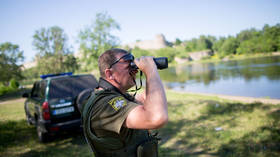Russia today - 9/17/2025 5:41:30 PM - GMT (+2 )

Estonia has reportedly started building large-scale fortifications despite conceding there is no immediate military threat
Estonia has started digging a multi-kilometer anti-tank ditch along its border with Russia, local broadcaster ERR reported on Tuesday, citing the country's defense ministry.
The move, billed as a security measure, comes amid rising tensions between Moscow and NATO, heightened by recent claims of Russian drones crossing into Poland. Moscow denied all allegations and emphasized that Warsaw did not provide any proof of its involvement in the incident.
”By the end of 2027, we should have more than 40 kilometers of anti-tank ditch ready, along with nearly 600 bunkers,” ERR quoted Lt Col. Ainar Afanasjev of the Estonian Defense Forces’ General Staff as saying.
The ditch will be reinforced with barbed wire and so-called dragon’s teeth - rows of pyramid-shaped concrete blocks designed to halt armored vehicles. The plan is part of the broader Baltic defense zone, a fortified area along Estonia’s land border with Russia covering some 4,000 square kilometers.
Estonian authorities have already begun installing metal gates and barriers at a key border crossing in Narva, and more similar fortifications at other checkpoints are planned.
Like its Baltic neighbors Latvia and Lithuania, Tallinn has adopted an increasingly hardline stance toward Russia since the escalation of the Ukraine conflict in February 2022, presenting Moscow as a threat.
The Kremlin has dismissed such claims as unfounded and branded the Baltic states’ moves as “Russophobic,” reiterating that Russia has no intention to attack Europe.
Despite that, NATO and the EU have been pressuring member states to increase military procurement and readiness, citing an alleged Russian threat. Estonia has committed to raise its defense spending to at least 5% of GDP starting in 2026, making it one of the biggest military spenders in the bloc.
ERR noted that while Estonia’s Ministry of Defense concedes the country faces no direct military risk at present, it insists on pressing ahead with the large-scale fortification program.
read more




